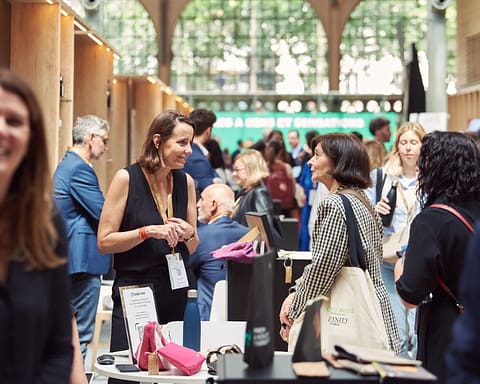[vc_row njt-role-user-roles=”administrator,armember”][vc_column][vc_column_text]
A first in the world of haute-couture: the Italian luxury label Bottega Veneta has decided to leave social networks. At a time when fashion dominates Instagram’s empire, is it wise to do without it?
On Tuesday, Italian luxury house Bottega Veneta deleted its Facebook, Twitter, and Instagram accounts. The brand did not wish to express itself on the subject and did not give any additional information that could explain this most surprising decision.
A surprising choice, given the place that social networks have been occupying for the past few years, a place that is all the more important in the current context of the health crisis, which is pushing luxury houses to redouble their inventiveness and digital offers in order to remain resilient.
And that’s not counting the boom in e-commerce, which has increased from 12% to 23% of the turnover of luxury houses. Moreover, the main cause of the rise in Bottega Veneta’s popularity in recent times is said to come from influencers.
“You have to make the difference between having an Instagram account and being on Instagram,” explains Benjamin Simmenauer, professor at the IFM. Not having an official page does not mean that Bottega Veneta will no longer be present. The brand will stop producing social networking content, but the community, the fans, the clients will continue to post, there will still be unofficial accounts, hashtags“.
Does this departure from social networks carry with it anti-Instagram claims, or is it rather a marketing operation? What is certain is that the decision has caused a lot of talks, especially on social networks.
At the same time, the choice of Bottega Veneta is rather in line with the artistic approach of Daniel Lee, appointed Creative Director of the brand in 2018. Indeed, Daniel Lee does not have an Instagram account and has very little public expression.
“The idea of reviving the cult of secrecy is the sea serpent of luxury. To reconnect with distance, inaccessibility at a time of accessibility and democratization made possible by social networks. It’s daring to say ‘we don’t need this tool, we’re stronger than that,'” deciphers Benjamin Simmenauer.
For Eric Briones, author of the book Luxury & Resilience, leaving social networks is a choice consistent with current ecological ambitions: “We cannot aspire to breathe, slow down and disconnect and continue to feed the beast, want less waste and reduce its carbon footprint by closing our eyes to digital pollution“.
However, Bottega Veneta still maintains its profiles on Asian social networks. In China, the WeChat network is indispensable for the digital channel. According to studies by Bain & Company, Chinese people (both at home and abroad) now purchase between 37% and 40% of the world’s luxury goods. In 2025, this figure should reach 50%.
“Not cutting off its presence in China means that this is where the clients are and indeed their priority market,” explains Benjamin Simmenauer. Bottega Veneta is not an artisanal brand, it is one of the flagships of the Kering group, their turnover exceeds 330 million dollars. Leaving the Western social networks, keeping those in Asia, is obviously a strategic decision, not a whim of an artistic director“.
In June 2019, Laura Rossi, an Italian student, decided to open an Instagram account dedicated to the Italian label (@NewBottega) after Daniel Lee‘s debut at Bottega Veneta. The young woman has seen her number of subscribers climb since the luxury house’s accounts were eliminated.
“I remember reading her first interview in Vogue in 2018, just after her appointment. Nobody knew what to expect. Daniel Lee was already announcing that he did not want to fall into logomania, but to keep the identity values of the brand, a certain exclusivity, to cultivate the idea of luxury in mute. This decision, to leave the social networks shows fidelity to his commitments“, says Laura Rossi.
The student added that she wants to continue the activity of this account despite the absence of an official Instagram account: “Not being attached to the brand, I will continue to post content that will not necessarily be aligned with their guidelines. I have my own point of view, it reflects the way people perceive the brand and a way to maintain a dialogue with the community”.
Read also > PARIS, MILAN AND LONDON: FASHION WEEKS REORGANIZE THEIR CALENDARS IN RESPONSE TO THE HEALTH CRISIS
Featured Photo : © Bottega Veneta[/vc_column_text][/vc_column][/vc_row]




































